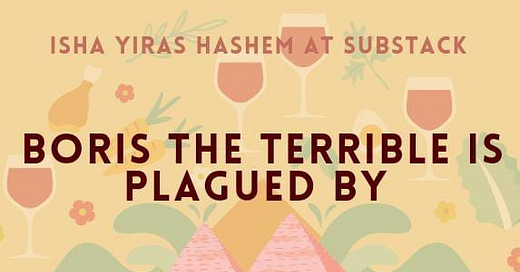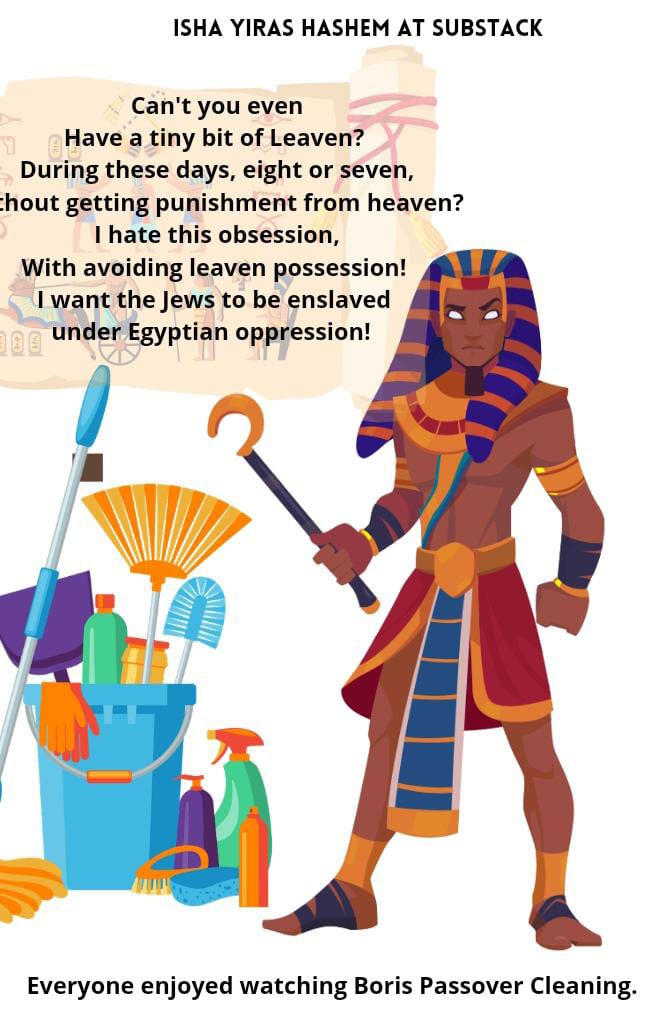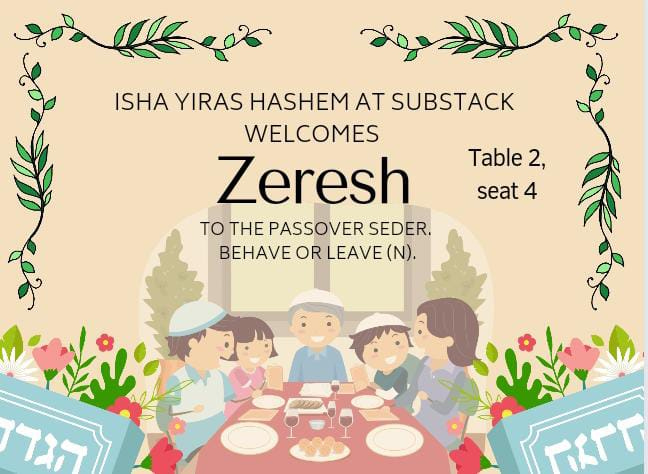Everyone knew that Boris the Terrible did not like the Jewish holidays. Rosh Hashanah gave him a head ache. Hanukkah kindled his anger and made his head spin. Boris fruitlessly tried to sabotage Tu Bishvat. And, being a descendant of Haman, the villain in the Purim story, Boris had lots of hang ups about Purim. But his deepest and most intense hatred was reserved for the most labor intensive holiday: Passover. On Passover, Jews remember being redeemed from slave labor in ancient Egypt.
If the Jews were still slaves in Egypt, Passover would have been Boris The Terrible's favorite holiday. Boris absolutely loved the idea of the Jewish people laboring as slaves in Egypt. He would have loved to see it, and he could not imagine anything that would make him happier. Every year, when spring time came around, Boris renewed his annoyance at G-d, for causing the Jewish redemption.
Boris liked to complain that, for a holiday that celebrates freedom, Passover was a lot of work. In fact, Passover was the most labor intensive holiday for everyone in the city of Chelm, especially Boris. He was forced to clean his store for Passover, and have a section for only Passover food. Boris hated cleaning! Even worse, Boris had to check the updated Passover guide yearly, to make sure he was stocked with all the products necessary.
Boris knew that the Jews could not have anything they called "chametz". "Chametz" translated to "leaven" in English, the language spoken in Chelm. In a rare silver lining to Passover, Boris enjoyed correcting the people who visited his store. Every time someone would say the word "chametz' in his hearing, Boris would yell, "That's LEAVEN to you!"
But Boris had to clean his store, in order to keep his monopoly on selling groceries in Chelm. He had no choice.
So Boris decided to dress up as an Egyptian for the weeks before Pesach. This provided some much needed comic relief for the Jews of Chelm, who asked for selfies with Boris at checkout. (If you can't view the picture of Boris dressed up as an Egyptian taskmaster, click “view pictures” in the top of this email, or see it on substack.)
On Passover, every person must feel a personal sense of redemption from physical and spiritual bondage. By dressing up as an Egyptian and making references to pyramids and slavery, Boris made that easy. People in Chelm could easily imagine how awful it could be to be enslaved to Boris.
The truth was, everyone in Chelm enjoyed the Egyptian Task Master performance. To cap it all off, Boris started singing a song about how much he hated Passover. The Jews smiled every time they walked into the store, and saw Boris, dressed as an Egyptian taskmaster, singing his song.
(Boris had composed this ditty at an all night jam session, at Chelm University's pre-Passover open mike poetry slam, trying to channel his frustration to a more creative outlet.)
Boris, singing:
🎵🎶🎵🎶🎵🎶🎵🎶
Can't you even
Have a tiny bit of Leaven?
During these days, eight or seven,
Without getting punishment from heaven?
I hate this obsession,
With avoiding leaven possession!
I want the Jews to be enslaved
under Egyptian oppression!
🎶🎵🎶🎵🎶🎵🎶🎵
Sarah Tries To Educate Boris
Sarah, a middle school teacher with excellent hearing, overheard Boris singing this song. She laughed, like everyone else, but then she realized he was actually serious. A little too serious.
Sarah: Why do you hate cleaning for Passover so much? Don't you realize how serious the prohibition against chametz is? Haven't you read Isha Yiras Hashem's posts on housekeeping motivation, and how chametz represents the evil inclination?
Upon hearing the word, “chametz'", Boris automatically responded, "That's leaven to you!"
Sarah: Do you even know what leaven is?
Boris: Of course not. I'm not even sure if it rhymes with Heaven or Even, so I used both in my composition.
Sarah: You should really check out Ohr Somayach's website. They say that leaven may be defined as "the resultant product of the fermentation of one of the five grains: wheat, barley, rye, spelt, and oats, after its combination with water."
Boris, irritably: Why don't you just concentrate on eating lots of Matzah instead? I hope you get a really big stomach ache.
Sarah, a bit puzzled: You really have to check out Isha Yiras Hashem on a website called "substack", she has some posts which would answer your questions. There are even colorful pictures.
___________
Privately, Sarah was a bit unnerved by his anti-Semitism. She had known Boris and his family for years, and was surprised at the intensity of his dislike for the Jewish religion. On the other hand, it certainly explained other aspects of Boris's behavior. He didn't really deserve an explanation. So she left Boris to his own devices.
Boris continued with his task, which was neatly stacking expensive boxes of Matzah in a corner. He thought about dropping bread crumbs in every box, but each box was individually double wrapped, with seals that could not be broken. Boris privately thought that the people of Chelm were wise not to trust him. He did not know that it is traditional to be extremely careful about the food you eat on Passover.
Zeresh’s Specialty Bitter Herbs
Another part of the Seder was eating bitter herbs. His daughter Zeresh specialized in bitter herbs. She loved the idea of Jews eating things that tasted bad. Zeresh would taste all the different horseradish roots to figure out which ones were the most bitter, and make sure they were the worst tasting for the Jews. The Jews knew they could count on Zeresh to source the bitterest herbs every year. It was a win win.
The rabbi in town was always trying to sell Boris the chametz. He explained to Boris that because he was a direct descendent of both Belshazzar and Edom, he could be trusted to be definitely not Jewish, which was ideal, because it would be terrible to accidentally sell the leaven to a Jewish person. Boris always refused, because he never wanted to help any Rabbi, ever. But Zeresh secretly contacted the Rabbi and told him that she would do it for a dollar, but only if he let her videotape him eating a teaspoon of her bitterest horseradish in the store. He agreed, and that became the custom in Chelm.
Zeresh Attends A Seder
Speaking of Zeresh, she felt that, in order to properly sabotage the Jews, she needed to understand them better. So she asked everyone she met shopping in her father's store for Passover for an invitation to the seder. Finally, a Jewish family said yes. (They were new in town.) They warned her that the Passover Seder was long, and there would be no food for a long time, but she wasn't deterred.
Zeresh asked what the dress code might be, and the Jewish family told her business casual, on the festive side. So Zeresh borrowed her father's Passover Cleaning outfit, which he wore to his business, and showed up to the Seder, casually dressed like a Egyptian taskmaster, which made her feel more festive.
The Jewish family tried to explain that this wasn’t Purim: Passover isn't a dressing up holiday.
Zeresh, hatefully: How can I be happy on Passover without imagining that you are my slaves?
Jewish Family: Leave! And don't come back!
Zeresh: That's leaven to you! Also I'm joking! I'll behave for the rest of the Seder.
Jewish Family: One more comment and you're out of here!
Zeresh followed along in the Haggadah, the book which tells us the fifteen steps of the Passover Seder. Four cups of wine was no problem for a descendant of Belshazzar, and she didn't mind dipping vegetables into salt water either, though Zeresh was not into eating vegetables. This was because she liked killing animals too much.
Then they came to the Four Questions. How is this night different than all other nights? Zeresh was feeling bored.
Zeresh: Couldn't you come up with something more original?
Jewish family: Like what?
Zeresh: Like, if you're in exile, why are you celebrating Passover? What's all this work worth to you?
Jewish family: Aha! You're the wicked son!
Zeresh: I'm a girl!
Jewish family: No, we are referring to the archetype of the four sons. There's the wise, the wicked, the simple one, and the one who doesn't even know how to ask. You would be the wicked son, and that's why you belong at our Seder!
Zeresh, who was charmed with the idea of being wicked: I told you I identify as a girl. I would be the wicked daughter. What happens to the wicked daughter?
Jewish family: It's son. And he gets his teeth knocked out. (The wicked son does not literally get his teeth knocked out, it's an expression meaning, he is answered back sharply.) There's nothing about a wicked daughter.
Zeresh, deciding that that was probably for the best, did not correct them again.
Near the end, the Jewish family explained to her that she shouldn't eat or drink anything after the afikomen, that means dessert, which is the last piece of Matzah. Zeresh, who was ready to leave anyway, announced that the first thing she would do when she came home was eat some chametz chocolate. The Jewish family shrugged their shoulders and told her to leave(n).
Zeresh said her good byes, and left the house. They happened to be up to the part of the Seder where it says G-d should pour out His wrath on the people who do not know Him, and upon the kingdoms that do not call out in His name. Thankfully, Zeresh didn't understand Hebrew, and she thought they were saying a fancy Passover good-bye especially for her. The Jewish family was able to finish the rest of their Seder in peace.
Postscript: Boris and Zeresh got their just desserts. One of her sons decided to convert to Judaism, and became a famous scholar in Bnei Brak. Free subscription if you find the reference in the Haggadah.
Notes and Sources:
Many thanks to Rebbetzin Devorah Fastag for her guidance. Many other people also deserve thanks. Specifically, RA, YA, SWG, BL, RG, LN, RS, and RDL beta read or suggested ideas. Debbie Rubinstein made many important edits to my flawed Spanish translation. All remaining mistakes are mine.
Sources for most of the above can be found at Ohr Somayach. Ohr Somayach has a Passover section on its website. https://ohr.edu/holidays/pesach/
Canva is used to design the memes.








Just finished reading it. It’s hysterical. I love it!!
I enjoyed this piece very much. Not as much as I enjoy a good Seder, but a lot.
And here’s how to put a link in a word: 1. Select (highlight) the word. 2. Click the ‘link’ button at the top of the Substack edit page. A box pops up. 3. Type the URL you want to link to in the box. 4. Save. Let me know if you have questions.